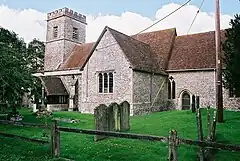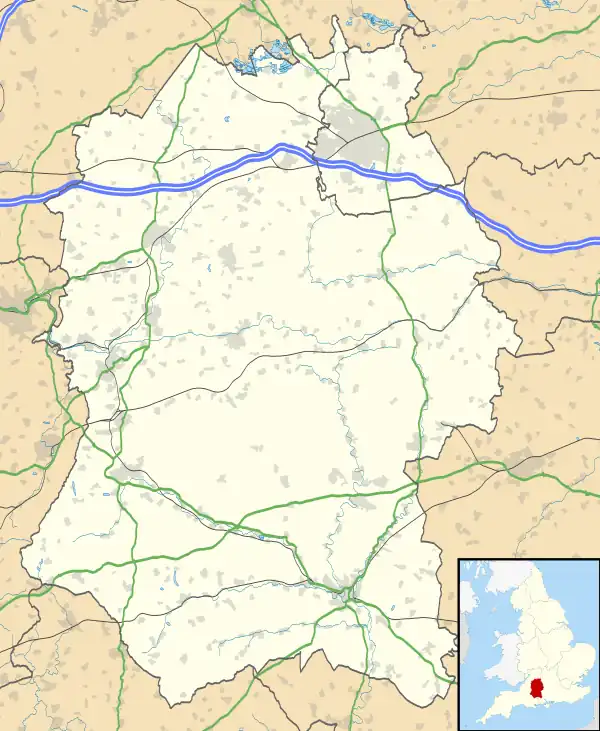Shalbourne
Shalbourne is a village and civil parish in the English county of Wiltshire, about 3 miles (4.8 km) southwest of Hungerford, Berkshire. The parish has a number of widely spaced small settlements including Bagshot and Stype, to the north, and Rivar and Oxenwood to the south. Before 1895, about half of the parish of Shalbourne (including its church) lay in Berkshire.
| Shalbourne | |
|---|---|
 St. Michael and All Angels | |
 Shalbourne Location within Wiltshire | |
| Population | 558 (in 2011)[1] |
| OS grid reference | SU3163 |
| Unitary authority | |
| Ceremonial county | |
| Region | |
| Country | England |
| Sovereign state | United Kingdom |
| Post town | Marlborough |
| Postcode district | SN8 |
| Post town | Hungerford |
| Postcode district | RG17 |
| Dialling code | 01672 |
| Police | Wiltshire |
| Fire | Dorset and Wiltshire |
| Ambulance | South Western |
| UK Parliament | |
| Website | www |
History
.jpg.webp)
Domesday Book of 1086 recorded a settlement of 48 households at Saldeborne or Scaldeburne.[3]
Under the Counties (Detached Parts) Act 1844, Oxenwood tithing was transferred from Berkshire to Wiltshire. Bagshot tithing was transferred in 1895, to complete the consolidation of the parish within Wiltshire.[4]
Parish church
The Anglican Church of St Michael and All Angels is Grade II* listed. Built in flint and stone with tiled roofs, it dates from the 12th or 13th century and was partly rebuilt and extended by G.F. Bodley in 1873.[5][6]
The nave is either 12th century or a 13th-century rebuilding; reconstruction of the south aisle in the 19th century reused two 12th-century doorways.[7] The chancel was rebuilt around 1300, and the tower added in the 15th century.[4]
Three of the six bells in the tower are from the 17th century.[8] The east chancel window has 1871 stained glass by Kempe.[6] A window by Henry Haig was added in 1995, from designs of Karl Parsons, who lived at Shalbourne from 1930 until the onset of ill health in 1933.[9][10]
The benefice was united with that of Ham with Buttermere in 1956.[11] Today the parish is part of the Savernake Team, a group of eleven village parishes.[12]
Other buildings
Also Grade II* listed are West Court farmhouse (15th and 17th centuries) and Shalbourne Manor farmhouse (16th century).[13][14]
Geography
The Shalbourne Stream flows northeast from its spring-fed source near Shalbourne village, to join the River Dun above Hungerford.[15][16]
Local government
The civil parish elects a parish council.[17] It is in the area of Wiltshire Council unitary authority, which is responsible for all significant local government functions.
Amenities
Shalbourne has a primary school,[18] and a village hall which was built in 1843 as a schoolroom.[19][20] It has a cricket pitch and pavilion with a bar. At the centre of the village, near the village green, are the pub (The Plough) and a small post office and shop which sells a variety of products and refreshments. The shop stocks organic vegetables from Shalbourne's community project, a small allotment that sells vegetable boxes to the village and surroundings.
Notable people
- Alexander Chocke of Shalbourne (1594–1625) was elected to Parliament for Ludgershall in 1621.[21]
- From 1608 until late 1637, tenants of the parish's Westcourt Manor included William Carpenter and his namesake son, both of whom emigrated to Weymouth, Massachusetts in 1638 on the Bevis from Southampton. The younger William was a founder of Rehoboth, Massachusetts. The Rehoboth Carpenter family's descendants number in the tens of thousands, among whom are two U.S. presidents and a Project Mercury astronaut. William Carpenter [Jr.] married at Shalbourne in 1625 Abigail Briant, whose family had resided in the parish since at least the late 16th century.[22]
- Jethro Tull (1674–1741), agricultural pioneer, from 1709 owned Prosperous farm, close to the northeast boundary of the present parish.[23]
- Marguerite de Beaumont (1899–1989), founding member of Girl Guides, biographer of Lord Baden-Powell, and recipient of the Silver Fish Award, Girl Guiding's highest adult honour.
See also
- Botley Down, a biological Site of Special Scientific Interest near Oxenwood
References
- "Parish population 2011". Office for National Statistics. Retrieved 19 April 2015.
- Byard, A. "Finds record for: BERK-DD8B11". The Portable Antiquities Scheme. Retrieved 28 August 2022.
- Shalbourne in the Domesday Book
- Page, William; Ditchfield, P.H., eds. (1924). "Victoria County History - Berkshire: Vol - pp228-234 - Parishes: Shalbourne". British History Online. University of London. Retrieved 19 January 2020.
- "Church of St. Michael and All Angels, Shalbourne". Wiltshire Community History. Wiltshire Council. Retrieved 19 April 2015.
- Historic England. "Church of St Michael and All Angels, Shalbourned (1184401)". National Heritage List for England. Retrieved 19 April 2015.
- "St Michael, Shalbourne, Wiltshire". Corpus of Romanesque Sculpture. King's College London. Retrieved 21 January 2020.
- "Shalbourne". Dove's Guide for Church Bell Ringers. Retrieved 20 January 2020.
- "Stained Glass Windows at St. Michael, Shalbourne". www.stainedglassrecords.org. Retrieved 20 January 2020.
- Loutit, Andrew (16 September 2010), Shalbourne, St Michael. des. Karl Parsons, Flickr, retrieved 20 January 2020
- "No. 40876". The London Gazette. 11 September 1956. pp. 5168–5169.
- "St. Michael & All Angels Church, Shalbourne". Savernake Team. Retrieved 19 January 2020.
- Historic England. "West Court farmhouse, Shalbourne (1033981)". National Heritage List for England. Retrieved 19 April 2015.
- Historic England. "Shalbourne Manor farmhouse (1184699)". National Heritage List for England. Retrieved 19 April 2015.
- "Southern Streams". The Kennet Catchment. Retrieved 21 January 2020.
- "Shalbourne". Catchment Data Explorer. Environment Agency. Retrieved 21 January 2020.
- "Council". www.shalbourne.org. Retrieved 8 June 2020.
- "Shalbourne C of E Primary School". Retrieved 19 April 2015.
- "The Shalbourne Village Hall". The Charity Commission. Retrieved 19 April 2015.
- Historic England. "Kingston Hall, Shalbourne (1365543)". National Heritage List for England. Retrieved 19 April 2015.
- "CHOCKE, Alexander II (1593/4-1625), of Shalbourne, Wilts.; later of Hungerford Park, Berks". History of Parliament Online. Retrieved 20 January 2020.
- "Carpenter Sketches", Eugene Cole Zubrinsky, FASG, (2009; see William1 and William2, Rehoboth section).
- Historic England. "Prosperous (1034015)". National Heritage List for England. Retrieved 20 January 2020.
External links
![]() Media related to Shalbourne at Wikimedia Commons
Media related to Shalbourne at Wikimedia Commons
- "Shalbourne". Wiltshire Community History. Wiltshire Council. Retrieved 19 April 2015.
- Shalbourne village website